#socio-economic barriers
Explore tagged Tumblr posts
Text
"Right to Education in India: Challenges, Implementation, and the Way Forward"
Introduction:The right to education is a fundamental human right that ensures every individual has access to quality education without discrimination. In India, the right to education is considered a fundamental right under the Constitution and has been reinforced by legislation such as the Right to Education Act, 2009. This act aims to provide free and compulsory education to all children…
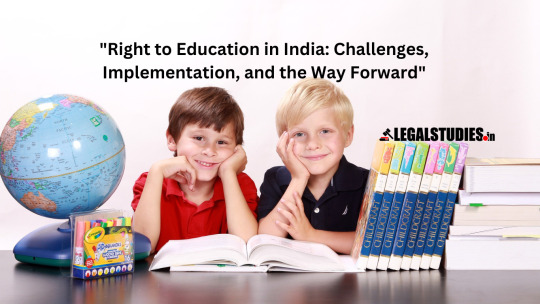
View On WordPress
#access to education#Challenges#constitutional provisions#education system#implementation#inclusive education#India#infrastructure#legal studies#legalstudies#legalstudies.in#quality education#regional disparities#right to education#Right to Education Act#socio-economic barriers#teacher shortages
0 notes
Text
genetically modifying human beings to ensure their kids won't be born disabled is steering dangerously close to eugenics, and also opens up problematic questions about who is or isn't considered "disabled". (for example, autism is widely considered a disability - so eradicating that means eradicating autistic people, which is obviously uhh. not great.) i'm physically abled, so it might not be my place to speak on this, but it seems to me that an ideal future isn't one in which disability doesn't exist, but one in which disability isn't a barrier to a person's happiness and quality of life.
Just to be clear, if your idea of an ideal future at any point involves killing disabled people or allowing disabled people to die- you're not a punk, you're a fascist. Hope that helps
#also genetic modification wouldn't get rid of disability#someone who's lost their legs in an accident is disabled#so is someone who's suffered a brain injury#there will always be disabled people#our focus shouldn't be on getting rid of disability it should be removing socio-economic barriers#just my two cence
22K notes
·
View notes
Text
Breaking Barriers: The Challenge of Electrification in Remote Areas
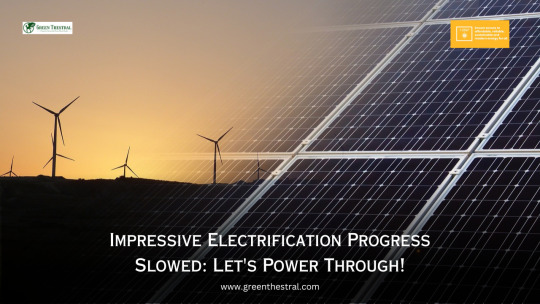
In today's rapidly evolving world, the importance of electrification cannot be overstated. Access to electricity is a cornerstone of modern living, enabling progress in education, healthcare, communication, and economic development. Over the past few decades, remarkable strides have been made in electrification efforts, but there remains a significant challenge in reaching the hardest-to-reach areas. This article explores the obstacles hindering impressive progress in electrification and sheds light on the efforts being made to overcome these challenges.
The Significance of Electrification
Electrification is a critical component of building sustainable and inclusive societies. It enhances the quality of life for people in both urban and rural areas, enabling them to access vital services and technologies. Electricity facilitates the functioning of schools, hospitals, industries, and communication networks, empowering communities to thrive and participate in the global economy. However, despite its transformative power, millions of people around the world still lack access to electricity.
The Impressive Progress
In recent years, electrification efforts have achieved remarkable progress. Governments, non-profit organizations, and private companies have collaborated to expand electricity access to remote and underserved regions. The adoption of renewable energy sources, such as solar, wind, and hydro power, has played a significant role in bringing electricity to areas with limited infrastructure. Additionally, advancements in technology and innovative micro-grid systems have made it possible to overcome geographical barriers and provide energy solutions to previously inaccessible locations.
Challenges in Reaching the Hardest-to-Reach
While impressive progress has been made, electrification in remote areas faces formidable challenges. Some of the key obstacles include:
Geographical Barriers: Many remote regions are situated in rugged terrains, such as mountains, forests, or deserts. Building and maintaining traditional power infrastructure in these areas can be prohibitively expensive and logistically challenging.
Lack of Infrastructure: Remote regions often lack basic infrastructure like roads and transportation networks, making it difficult to transport materials and equipment needed for electrification projects.
Affordability: In impoverished regions, the cost of setting up and maintaining electricity infrastructure can be a burden for both the communities and the providers.
Political and Social Instability: In certain areas, political conflicts and social unrest can hinder progress in electrification efforts, discouraging potential investors and disrupt ongoing projects.
Environmental Concerns: Balancing the need for electrification with environmental conservation is crucial. Some remote areas are ecologically sensitive, and care must be taken to ensure sustainable and eco-friendly energy solutions.
Solutions and Initiatives
Despite the challenges, numerous initiatives are actively working to bring electricity to the hardest-to-reach regions. These efforts include:
Off-Grid and Micro-Grid Systems: Off-grid solar systems and micro-grids provide localized and decentralized energy solutions, bypassing the need for extensive infrastructure. They can be tailored to suit the specific energy demands of a community.
Mobile Technology: Mobile technology has become a powerful tool in facilitating electrification. Mobile payment platforms and smart grids help manage energy distribution efficiently.
Public-Private Partnerships: Collaborations between governments, non-governmental organizations, and private companies have proven effective in pooling resources and expertise to tackle electrification challenges.
Miniaturized Technologies: Technological advancements have led to the creation of compact and efficient energy solutions, such as portable solar panels and mini wind turbines, making them suitable for deployment in remote areas.
Community Engagement: Empowering local communities to take ownership of electrification projects fosters a sense of responsibility and sustainability.
Conclusion
Impressive progress in electrification has undoubtedly improved the lives of millions, but there is still much work to be done to reach those hardest-to-reach areas. The challenge of electrifying remote regions requires innovative solutions, collaborative efforts, and a commitment to sustainable development. As technology continues to advance and awareness grows, there is hope that the barriers hindering electrification will gradually crumble, lighting up the lives of those who have remained in the dark for far too long. It is essential for governments, organizations, and individuals to come together and invest in electrification as a means of driving positive change, fostering economic growth, and leaving no one behind in the pursuit of a brighter and sustainable future.
What's In It For Me? (WIIFM)
Are you curious about the state of electrification in remote areas and the challenges hindering its progress? Discover how impressive efforts to bring electricity to the hardest-to-reach regions impact global development, the environment, and the lives of millions. Learn about innovative solutions and initiatives that can transform the future of those in need, while contributing to a sustainable and inclusive world.
Join the Movement: Let's Light Up Lives Together!
Be a part of the electrification revolution! Help us overcome the challenges of reaching remote areas with electricity. Share this article to spread awareness and inspire others to support electrification efforts. Together, we can make a difference and empower communities worldwide. Click here to learn more about how you can get involved and contribute to this meaningful cause.
Blog Excerpt
The quest for electrification in remote and underserved areas has seen impressive strides, yet it faces significant challenges that slow its progress. Access to electricity is pivotal in shaping modern living, but millions of people still lack this essential resource. This article delves into the obstacles hindering electrification, including geographical barriers, lack of infrastructure, and affordability issues. We explore the solutions and initiatives driving change, such as off-grid and micro-grid systems, mobile technology, and community engagement. By addressing these challenges head-on, we can create a brighter and sustainable future for all.
Meta Description (320 characters)
Discover the challenges impeding impressive progress in electrification efforts to reach remote areas. Explore innovative solutions and initiatives, empowering communities and transforming lives worldwide.
#Impressive progress in electrification#Electrification challenges in remote areas#Hardest-to-reach electrification solutions#Sustainable electrification initiatives#Impact of electrification on global development#Electrification and environmental conservation#Access to electricity in underserved regions#Off-grid and micro-grid systems for remote areas#Mobile technology in electrification#Empowering communities through electrification#Innovations in remote electrification#Affordable electrification solutions#Overcoming geographical barriers in electrification#Advancements in off-grid technology#Micro-grids for remote communities#Electrification challenges and opportunities#Electrification and socio-economic development#Renewable energy in remote areas#Empowering the hardest-to-reach regions#Progress in electrification initiatives#Electrification impact on education and healthcare#Electrification projects in challenging terrains#Sustainable energy solutions for remote regions#Innovations in rural electrification#Electrification's role in community empowerment#Social impact of electrification efforts#Challenges in electrification funding#Remote electrification and climate change#Importance of electrification access for all#Addressing electrification disparities
0 notes
Text
Sun Dominant Themes — 𝐍𝐚𝐤𝐬𝐡𝐚𝐭𝐫𝐚 𝐎𝐛𝐬𝐞𝐫𝐯𝐚𝐭𝐢𝐨𝐧 𝐒𝐞𝐫𝐢𝐞𝐬 𝐩𝐚𝐫𝐭 𝟏𝟑
Understanding why planets exalt in certain nakshatras, and houses, will give you an even better foundation for all nakshatra lords. For example, Venus loves being in Revati because this is where it can be unrestricted and as flourishing in its themes as it desires to be, since Revati is peak freedom and transcendence; Ketu loves being in Jyestha because this Scorpio nakshatra continuously releases so much heat which allows it to function at its highest level; and Sun is its best version when it is in Ashwini, because this Aries nakshatra allows the Sun to be as hyper-independent and selfish as it desires to be, and Ashwini being Ketu helps one attract resources to further advance oneself — a theme I am seeing in all the Sun nakshatras.

The symbol of Krittika nakshatra is a sharp knife, and its deity is the fire god, Agni. This emphasizes the heat in Krittika which is connected to its transformative nature. This is seen in the refinement of blades, where the beginning stages involve forging – the process of heating and shaping of the metal – and then heat treating. Resources are used with precision in Krittika, anything unnecessary being cut away as resources are channelled with focus so that one rises to the top. The ruling deity of Uttara Phalguni nakshatra is Aryaman, the guardian of social contracts and hospitality. Aryaman is a solar deity, giving more emphasis to the life-giving heat and brightness of this Sun nakshatra. With Uttara Phalguni, resources are built and sustained through agreements, partnerships and community. Creating mutual connections and valuing generosity will lead to later pleasures, as this nakshatra is symbolized by the back legs of a cot and the word Uttara in Sanskrit can mean "latter," "subsequent," or "final." Uttara Ashada is ruled by the Vishwadevas, the universal gods, this indicating the superior, hyper-independence and highly resourceful nature of this nakshatra. This enables mastery in resource mobilization and strategic planning.

Uttara Ashada Sun Orlando Bloom portrays the character Will Turner in Pirates of the Carribean, who starts out as an accomplished blacksmith by trade – his fantastic swordsmanship a product of his work with tangible resources like metal and tools, demonstrating his ability to make effective use of his environment.
The agency of the self and one's independence is due to the aftermath of the Ugra nakshatras having burned away previous barriers & roots, killing off enemies in order to pour into the world through love, beauty and creativity (Venus themes). This propels Sun nakshatras to be unbound, having them focus on making anything into a useful resource, so that one's inner solar light aligns with their material plane. This is interestingly explored in films through the so-called "American Dream".
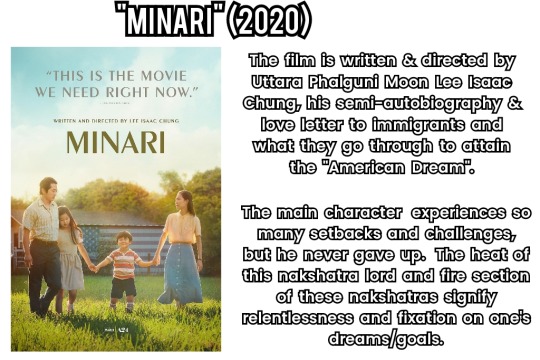
The "American Dream" refers to the belief that anyone, regardless of their socio-economic status and background, can achieve their dreams and make a better life for themselves in a society where upward mobility is accessible to all. The core ideals of this belief are explored in the film The Pursuit of Happyness, starring Uttara Phalguni Sun Will Smith who plays a struggling salesman rising from poverty to attaining professional success as a stockbroker — his character being driven by persistent effort, ambition, and belief in upward mobility.
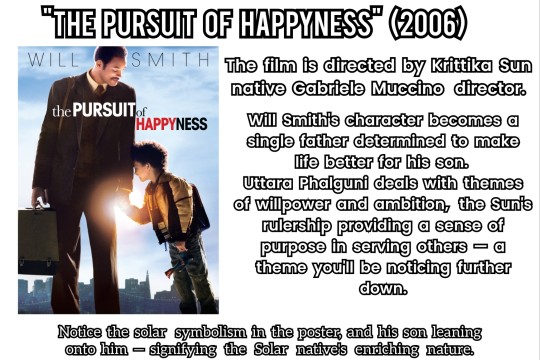

The theme of the human spirit's resilience in the pursuit of personal dreams is also seen in the film Forrest Gump, starring Uttara Phalguni ASC Tom Hanks who plays a low IQ man who goes through many challenges and still never gave up on his dreams.
Sun nakshatras are more commonly associated with strong themes of ambition, leadership and success.
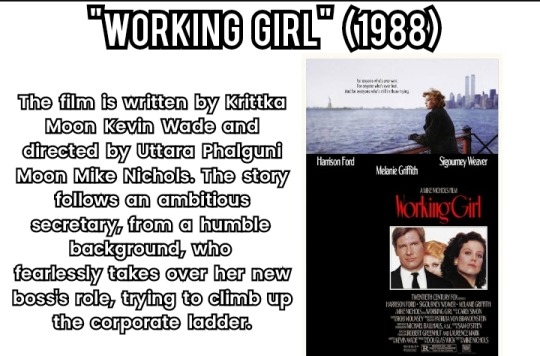
Aja Naomi King has Uttara Ashada Sun and Uttara Phalguni Moon, making her a dominant fire rashi native. She portrays the character Michaela Pratt in How To Get Away With Murder. She is a young woman who is an ambitious overachiever, possessing an intense fire in her and is relentless in chasing after her goals with focused determination.

The character Paris Geller from Gilmore Girls, portrayed by Uttara Ashada Moon native Liza Weil, is known for her relentless ambition, being an aggressive perfectionist, and possessing a fear of failure which mirrors Michaela Pratt’s personality, often the cause of her clashing with others.

Sun natives are able to sacrifice and delay gratification for their goals. The elephant tusk of Uttara Ashada represents enduring strength, the nakshatra also being in the first section of the Capricorn rashi (Saturn supporting themes of endurance and delays). Uttara Phalguni's symbol is a bed or hammock, which represents the rest after hard work and generosity, completing the journey from Purva Phalguni in this final stage. And Krittika being the blade, or razor, signifies it as a cutting force able to slice through obstacles, fuelled by a desire to execute excellence.
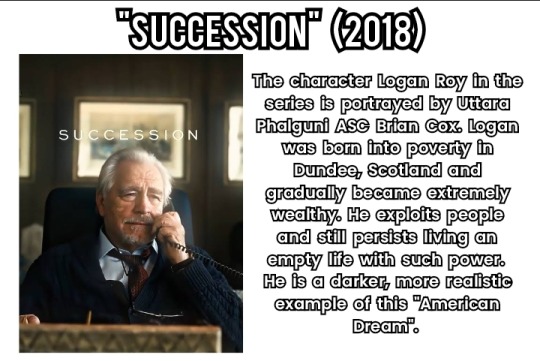
Daniel Plainview in There Will Be Blood exemplifies the darker, more ruthless and capitalistic side of this "American Dream" — operating more Ketuvian as he is portrayed by Ashwini Moon native Daniel Day Lewis, drawing parallels with Ashwini Moon Christian Bale in American Psycho (further emphasizing why the Sun exalts in Ashwini, as Ashwini possesses this pure, ungovernable and all-consuming masculine energy which can become self-building).

The book Oil! follows the son of an independent oilman who initially idolizes his father's rise to power which has a rags-to-riches quality to it. The book highlights the nefarious strategies that oilmen employ through the main character's sympathy towards the underdog people (oilfield workers), a solar theme which will support further points I'll be touching on. But this corruption of the self from accumulating so much intoxicating power is definitely the darker side of Sun nakshatras.
The character Plainview uses oil as a lucrative resource and leverages it to build his empire, also coming from humble beginnings. He embodies this 'self-made', hyper-independent archetype in which hard work highlights one's determination and ability to turn opportunities into wealth. But the writer of the film, and the author of the novel Oil!, shine light on the emptiness and loneliness of this accumulation.

In the story, The Great Gatsby, the character Jay Gatsby initially comes from a poor background, and he meets a high-status woman who he falls in love with. She becomes one of the reasons for his drive, shaping his desire to escape poverty and become successful.
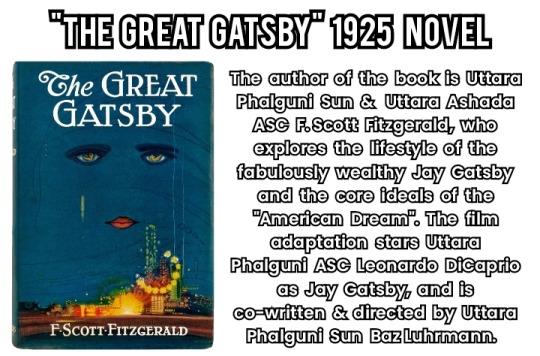
Uttara Phalguni's ability to outwardly evolve to positions of power and have access to things which are symbolic of pleasure and luxury emphasizes the inward radiance and resilience they possess to overcome challenges.
There is a Solar archetype which possesses a type of independence and a resourcefulness that doesn't translate into dominance, but rather into strictly following one's own path of righteousness — remaining strong willed no matter the people one is surrounded by. And there is a level of generosity and duty to this archetype, as Surya, the Hindu Sun god, embodies Dharma (which is related to duty, righteousness and upholding truth).

Will Turner fully embodies this archetype. Even when he's surrounded by pirates, and learns of his familial background of piracy, he stubbornly sticks to what he believes is right. His character has consistently been a strong moral compass in the franchise, upholding righteousness and truth — pointing to the higher leadership and moral integrity important in Uttara Ashada, as this nakshatra is ruled by the Vishwadevas, who are believed to reward those who follow moral principles and righteous paths.
Being burdened with so much duty, Surya (the Sun god) has to endure distant relationships with his close familial bonds. Will Turner mirrors this exactly, his duty as the Captain of the Flying Dutchman (a powerful evolution of his character as he initially started as a humble blacksmith) binds him to a duty higher than his mortal life. Because of this, he could only see his son and wife every once a decade, much like how Surya cannot be close to his sons and spouses.

A lot of sacrifices that they endure include cutting away human attachments, although this archetype is moreso explored from the hyper-independent lens in Claire Nakti's Sun Dominant Men video, as they voluntarily become absent fathers/deadbeats from their inherent selfishness — very much opposing the ideals of many Sun gods, but a correct negative manifestation nonetheless.
All Sun gods support this solar archetype of justice, leadership and source of nourishment. Helio, in Greek mythology, personifies the Sun, bringing light to the world, also regarded as the god of sight. Surya is a source of vitality and justice. Ran, the Egyptian Sun god, serves as a great protector, encompassing intense sun rays which ward off evil.
Characters which embody this protective, superior force are often played by Ketu and Sun nakshatra natives (and as Ketu nakshatras are seen as dominant forces in nature, we see how Sun nakshatras adapt in isolation, and become dominant as well, using tools and resources to remain resilient). Claire Nakti already explored this with Mula's connection to Hercules, while I connect the nakshatra Uttara Ashada to characters such as Robin Hood & Tarzan. Just as the Sun gods symbolize a life-giving energy which keeps stability in the universe, George of the Jungle and Tarzan are characters who both protect the jungle and its inhabitants from poachers and other humans with bad intentions — their presence alone warding off evil. Both characters serve as guardians to ensure harmony in the jungle.
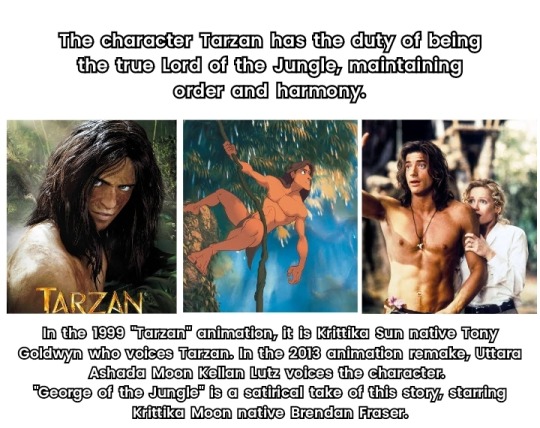
The elephant tusk (of Uttara Ashada) often signifies, in many cultures, the protection of wildlife, especially from those who want to exploit and dominate nature. It also symbolizes a tool for survival, and it is associated with higher stature and power. This theme of one being the source of life and resources is seen in Robin Hood, a character which has Uttara Ashada influence. Robin Hood is known for safeguarding the well-being of his community, ensuring that their nourishment and dignity is preserved as he distributes wealth from the rich to the poor.

The bridge between Purva Ashada and Uttara Ashada could be represented by the purpose of Sagittarius — the archer aiming straight for victory. Uttara Ashada can be the release of the arrow, the culmination of focus to execute the final victory, as its stars lie close and pointing to the Galactic Center (signifying the bullseye). Uttara Ashada carries the final stage of the archer's triumph, embodying this legacy after the swift release of the arrow.
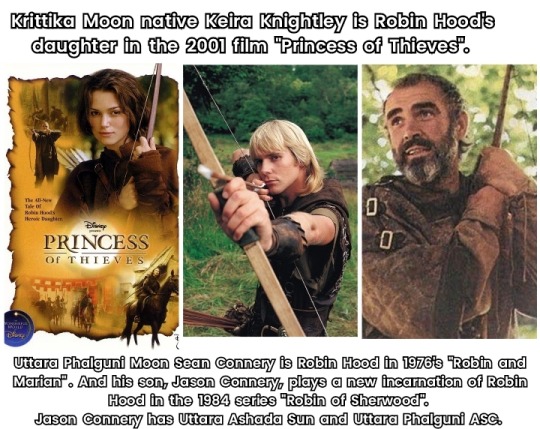
Much like Tarzan and George, Robin Hood lives in nature. Sun makes one completely self-sufficient, free from societal and religious roots which holds one back from finding their true essence. And the forest or woods represent a place one can explore their true selves and burn away what's false. The dominance of the Sun is seen in these characters' ability to comfortably live in such a place full of hidden threats like wild animals, bandits, or poachers. While for Ketu this theme signifies their huntress and taming power over the wild, for Sun it signifies their radical freedom and adaptability. Living in the forest, Robin Hood represents the figure of the outsider.

In the 2011 film Red Riding Hood, the character Peter is a woodcutter who embodies the archetype of the lone wolf. He is portrayed by Krittika Moon & Uttara Ashada ASC native Shiloh Fernandez. He knows the forest very well, and is often associated with the pure, wild aspects of it. He is very much like George of the Jungle, in that his love interest is also played by a Magha native, which I found this Sun-Ketu association very interesting.

His free nature and rough exterior (representative of his authenticity, making him a misfit in society) is what misleads the viewers into thinking that he is the werewolf that's been killing the townsfolk, but the truly animalistic and consuming force of the story is the character played by Ashwini Moon Billy Burke.
This lone wolf archetype supports their ability in being resourceful within their surroundings, often seen in survival stories in which the Solar native is stranded and is literally isolated from civilization.

Blue Lagoon (1980) is a survival film about two children living on an island after a shipwreck. Krittika Moon Christopher Atkins plays Richard, who becomes deeply attuned to the rhythms of the island, learning how to make use of the natural resources for their survival.
In the film Mad Max: Fury Road, Uttara Phalguni Sun Tom Hardy embodies this lone wolf archetype through the character Max. The story has a hyper-patriarchal system which is built around the hoarding of resources and exploitation of others. Max is completely removed from this society, prioritizing his own survival and maintaining his autonomy above all else.
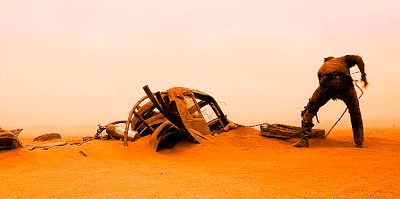
His detachment makes him representative of someone who can solely rely on their resourcefulness and sharp instincts. This film is great as it stars two Phalguni natives; the character Furiosa being portrayed by likely Purva Phalguni ASC native Charlize Theron. Her warriorship is based around seeking a better future for the feminine, which is marked by love and autonomy.

Furiosa, being Venus and an Ugra nakshatra, represents the fight for liberation and happiness, particularly on the freedom of Immortan Joe’s enslaved women, and her own freedom from such a restrictive society unfit for the feminine. The women's rejection of the patriarchy mirrors Max’s independence outside the system. Initially, he aligns with her merely out of necessity as she and the wives possess resources beneficial for his survival. But he treats them as equals, recognizing their autonomy and agency. Max's collaboration with them emphasizes Uttara Phalguni’s purpose of creating alliances and partnerships for higher purposes, supporting the journey that started from Purva Phalguni nakshatra.

After aiding Furiosa, Max returns to his hyper-independent lifestyle; burning the attachments he formed with the women, and returning to his path that is away from the society.
This ability to survive by oneself, to reshape one's environment, mobilizing resources even in barren circumstances, is a theme for Sun nakshatras — further exaggerating this lone wolf, mysterious archetype (as seen with Max in Mad Max: Fury Road and Peter in Red Riding Hood).
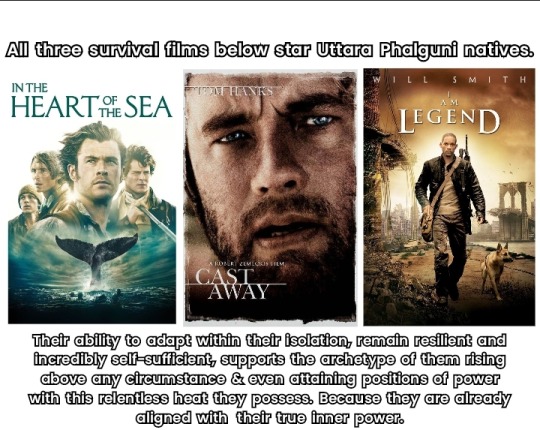
The Sun is the natural giver of light and energy, but it does not receive light in return. Solar natives, often being so self-sufficient, give to others but rarely lean on them for much support. The character Elliot Alderson from Mr. Robot is a hacker, his final achievement towards the end of the series making him a modern day Robin Hood. His mission to expose corruption and empower the oppressed is akin to the Sun being a source of illumination, Krittika especially being known to cut away illusion. He is played by Krittika Sun Rami Malek.

Elliot remains emotionally isolated, as he has noticed that anyone who gets too close to him burns in the end — very similar to how the Sun god, Surya, burns and shines too brightly that his wife, Samjna, runs away from him. Elliot's solitary nature makes him feel extreme loneliness, but he maintains a distance from others, his hyper-independence stemming from his traumatic past and his mistrust of others.
There's a genre of film which explores the cause of such imbalanced independence, much like how Max's reason for burning attachments being due to trauma and previous lose. Christmas Carol movies often have Sun natives casted in them, portraying characters that possess a level of misanthropy and selfishness which drive them into further isolation.
The famous character, Ebenezer Scrooge, is a miserly, bitter, and cold-hearted old man who despises Christmas as it is associated with things of generosity and happiness. His name has literally become synonymous with selfishness, cynicism, greed and a lack of compassion. Ebenezer leads a solitary life, being estranged from family and detached from community due to his cold demeanour and focus on material gain. A Christmas Carol is a tale of Scrooge's redemption through three spirits, who highlight moments of lost joy, compassion, and the choices that led to his current misery and his future lonely funeral.

After his epiphanies, thanks to the spirits who took him on a journey of rediscovery, his redemption is seen when he wakes up on Christmas morning being transformed into a generous, joyful person — helping the community and reconnecting with his family. His renewed sense of compassion from being such a mean, wicked old man could be interpreted as the Sun burning away negativity to rekindle the warmth and generosity that the Scrooge has repossessed within himself. This tale is retold in the 2008 Barbie in a Christmas Carol, in which the character Eden Starling is a glamourous singer who is extremely self-centered and arrogant. She does not believe in Christmas and even refuses her employees from celebrating it.

She is voiced by Uttara Phalguni Sun and Uttara Ashada Moon native Morwenna Banks. Much like the timeless festive tale, three ghosts visit her on Christmas Eve, taking her on a journey through her Past, Present and Future. This leading her to have epiphanies regarding how much of her light had been dimmed and how lonely her future will be. These scrooge characters were once so brilliant and bright, but their inner light became eclipsed by bitterness, lose, or regret, leading to a life devoid of merriness — and being cold and frosty towards others.
Life’s challenges, such as betrayal, lose or disillusionment, leads these solar natives to retreat into isolation and despair. In the film Jingle Jangle, the character Jeronicus is a vibrant inventor, radiating so much brilliance and inspiring those around him.

Though not as cruel as Scrooge was, his arc still mirrors the Christmas Carol tale, in that his light becomes renewed. His young and redeemed older self both embody the festive spirit and joy of Christmas, acting as conduits for the magic, wonder, and generosity for the season.
The transformative journeys of these solar characters also extend to the Grinch, from the 2000 film How the Grinch Stole Christmas, the character portrayed by Uttara Ashada Sun native Jim Carrey. The tale was originally created by Uttara Phalguni Moon native Dr Seuss, first published in 1955.

The Grinch absolutely despises Christmas, much like Scrooge, being deeply consumed by resentment and envy while he isolates himself from the joyous Whoville community. His redemption is seen in him integrating himself into the community with newfound warmth, after experiencing an epiphany through a little girl’s unwavering joy and forgiveness. He returns the gifts he has stolen, realizing that Christmas is about love, not material possessions.
There are solar symbolisms in Christmas traditions, besides the gift-giving and festive feasting. These traditions can be traced back to ancient winter solstice celebrations, which made the symbolic rebirth of the sun, as the daylight hours began to increase after the winter solstice.

In 2018's The Nutcracker and the Four Realms, the character Clara, portrayed by Krittika ASC Mackenzie Foy, experiences a journey which can be symbolic of the winter solstice. The story begins with Clara in a dark emotional space following the death of her mother, this darkness being much like the world descending into the longest night at the winter solstice. But Clara seeks the key to her mother’s gift, which signifies as a source of life, fertility, and illumination that unlocks potential — the gift quite literally being a golden egg. Clara and her companion must retrieve the key and restore harmony to the unstable magical land. This theme of restoration, new hope, and redemption in a lot of these scrooge films, is symbolic to the Sun’s rebirth during the solstice — the return of life.
The practice of illuminating the Christmas tree with lights and ornaments mirrors the Sun's return, symbolizing a brighter future with the coming year. The infectious joy and generous acts during this festive season reflect the gratitude for the life-sustaining force that the Sun is, and the light for new hope it represents, as it promises abundance for the year ahead. The twin deities of Ashwini nakshatra are associated with rejuvenation, new beginnings, and vitality; this resonates with solar qualities, further explaining why Sun feels naturally at home in Ashwini. The Ashwini Kumaras are divine healers who bring restoration and renewal, just as the Sun sustains all living beings with its energy.
The character Robin Hood, much like the Sun, is a symbol of hope for the downtrodden, fighting off the darkness of evil and corruption. He sustains the spirit of his people by redistributing wealth and restoring their faith in justice, consistently being a force of resistance. The Sun serves as a profound symbol of redemption, perfectly embodying the cycle of renewal and the promise of transformation on earth. Its daily rise eliminates darkness, rejuvenating life and reinstituting balance in nature after its lengthy absence. Sun illuminates the paths which signify growth, healing, and change. The very pure symbolism of the Sun makes it an enduring metaphor for hope, forgiveness, and the power to provide. Robin Hood's actions literally restore the imbalance, which was created by corruption and darkness, giving the poor a chance to continue building their lives. Robin Hood stands as a symbol of light against injustice, signifying a timeless reminder that even in the face of darkness, renewal and justice are always within reach. The character Elliot Alderson is also the perfect representation of this, for anyone who has watched Mr. Robot (the only series I'd happily recommend to anyone — it's very dark though).
Merry belated Christmas! 🎄
#krittika#uttara phalguni#uttara ashadha#aries#taurus#leo#virgo#sagittarius#capricorn#sidereal astrology#vedic astrology#astrology#astro observations#astrology observations#vedic observations#nakshatra series#nakshatra observations#vedic astro observations#vedic astro notes#sun#ashwini#ketu#purva phalguni#purva ashada#venus
189 notes
·
View notes
Text
quebec's language laws have protected quebec in a weird way from late stage capitalism. by no means to idealize quebec, i just don't see it wildly talked about how a language barrier has stalled capitalism.
i am sure there are socio-economic papers written on this. like because you need to have french contracts, terms of service and signage, a lot of american companies and global conglomerates don't go to quebec. like a lot of businesses just don't exist in quebec compared to the rest of canada. like franchise restaurants. quebec has a lot less franchise restaurants. oh there are a couple but they are like very specific to quebec and also just in the more metropolitan areas. usually in suburbs you don't have a lot of franchise restaurants.
this is also sweepstakes. because in quebec a mail in entry is required for any sweepstakes. you don't have to buy the product. also a lot of brands need to have their labels in french so a lot of products just don't get to quebec market
also a lot of the population wants to be serviced in french so they prefer quebec companies. this is why there are quebec specific internet and telephone companies. bootlegging is wild popular because there was usually a lag before you could get english content because they needed to make the french dub.
its also why movie rental stores stayed open for a long time in quebec because they catered to french language dubbed movies. like blockbuster did come to quebec but it didn't have the same chokehold on the market. like i rarely went to blockbuster growing up, there were 3 local video rental places that had more titles than blockbuster because the blockbuster business model didn't appeal to quebec residents. especially if you wanted to rent french versions of video games.
anyway, just interesting to think about
#i hate franchises and monopolies#canada#quebec#i remember before couche tard ruined depanneurs there was a dep that had the best juice#i miss depanneur perrette to this day
367 notes
·
View notes
Text
The Wachowski sisters are the best. THE BEST
They made Matrix (1999) when no one cared about giving space to LGBTQ+ representation. They pretty much sneaked in a trans allegory into mainstream cinema without tripping ANY wires! And it has made rounds in film circles, VFX circles, dude-bro film critic circles, Name It!
They were left alone for a decade and they came up with the Marvel that is Sense8. Now this script just takes off with the idea of finding an ephemeral connection with not just one but a crowd of other people across the globe without ever meeting them. Sounds like the trans experience to me.
Yk what else sounds like a trans experience? Having mothers and fathers and children and clusters with no barriers of sex and gender. 🤌 An unbreakable umbilical cord that binds me with my 'mother'? Bring it on. Being able to contact someone and reach out for help even if they are in a completely different socio-economic strata, brought up differently and have nothing in common with? BRING.IT.ON.MAMAA!
Cis-het sloths don't have anything on me 🌈. They don't understand 'community' like I do. They are stuck in their blood relations and friends but I don't have any. I make my family. Who is in that family is not always in my control but all of them have shared the same pain, ostracization and hate that I went through. THEY GET IT!
Anyways, Lana and Lilly Wachowski, my heart is with you. Manifesting that I get to work with you sometime.

#sense8#wachowski sisters#ballroom#movies#queer movies#queer cinema#trans stuff#lana wachowski#lilly wachowski#nomi marks#lito rodriguez#capheus onyango#amanita caplan#nomi x amanita#riley blue
51 notes
·
View notes
Text

Equality is a fundamental concept rooted in the belief that all individuals, regardless of their background, race, gender, religion, or socio-economic status, deserve equal rights, opportunities, and treatment.
It is more than just a legal or theoretical idea; it's a guiding principle for creating a just and fair society.
Equality means recognizing and respecting our differences while ensuring that these differences do not lead to discrimination or unequal treatment.
It involves creating environments where everyone has the access and opportunity to thrive and succeed. This concept extends to all aspects of society, including education, employment, healthcare, and governance. Promoting equality requires a commitment to understanding and addressing the various barriers that prevent individuals and groups from experiencing the same opportunities and benefits as others.
It’s about leveling the playing field so that everyone has a fair chance to reach their potential, contributing to a more harmonious and productive society.
It's a continuous process of learning, unlearning, and re-evaluating societal structures to ensure that equity is at the heart of all policies and practices.
#equality#equality matters#hebrew#learnhebrew#jewish#hebrew langblr#language#israel#jumblr#human rights
8 notes
·
View notes
Text
The Interwoven Threads of Classism and Sexism in the Working Class
Classism isn't just about economic disparity; it's about the power dynamics that keep certain groups subjugated, ensuring that they remain in their "designated" place in society.
Women in the working class often bear the brunt of both classist and sexist prejudices. They're doubly disadvantaged, facing barriers not just because of their economic status but also because of their gender.
Now, here's where things get even more intricate. One might wonder why we can't address sexism within the working class without hesitation. The reason is both sinister and deeply rooted in the mechanics of capitalism. Capitalism, as a system, thrives on hierarchies. It requires a stratified society where there's always a lower rung—a safety net, so to speak, but not the kind that catches you. Instead, it's a net that ensures there's always someone beneath you, a group that those teetering on the edge can crash upon if they fall.
In this setup, women, especially working-class women, often become the "bodies on the floor." They're the cushion for those tumbling down the socio-economic ladder. By ensuring that sexism remains rampant within the working class, capitalism guarantees that there's always a demographic that bears the maximum weight of the system's failures.
So, what does this mean for us, the observers, activists, and advocates? It means our fight is multi-dimensional. Tackling classism without addressing the inherent sexism within it is a half-battle. Similarly, addressing sexism without understanding its ties to capitalist structures is an incomplete effort.
Our approach needs to be holistic. We must recognize the intersections of various forms of discrimination and understand how they feed off each other. Only then can we hope to dismantle the systems that thrive on keeping large sections of our society oppressed.
Stay informed, stay united, and remember: the fight for justice is always multifaceted. 💪🌍✊ #IntersectionalJusticeMatters
#heterorealism#classism#working class women#marxist analysis#intersectional feminism#class war#socialist feminist
36 notes
·
View notes
Text
“‘Private education is not fair. Those who provide it know it. Those who pay for it know it. Those who have to sacrifice in order to purchase it know it. And those who receive it know it, or should. And if their education ends without it dawning on them, then that education has been wasted.” - Alan Bennett.
One year ago almost to the day, Sir Kier Starmer, our new prime minister, promised to end the “snobbery” that surrounds academic vs vocational education. Speaking in Gillingham Kent, he said the ‘class ceiling' needed to be broken and he vowed to fight the existing reality that social background - and by default, economic background - determines a child’s future opportunities.
This pledge was part of his fifth mission statement where he promised to “break down the barriers of opportunity at every stage for every child.” More importantly he emphasised:
“This mission is my core purpose and my personal cause: to fight, at every stage, for every child, the pernicious idea that background equals destiny, that your circumstances, who you are, where you come from, who you know, might shape your life more than your talent, effort and enterprise.
“No, breaking that link, that’s what Labour is for. I have always felt that. It runs deep for me.” (Keir Starmer:05/07/23)
Starmer is absolutely right when he says a child’s socio-economic background determines the opportunities open to them. Money buys privilege. One reason private schools are so popular among better off parents, especially the very rich, is that class sizes are so much smaller than in the state sector, and as is well known, “smaller classes lead to higher quality education”. From early years of prep schooling right through to the elite universities such as Oxford and Cambridge, money buys academic success. It is no accident that 60% of top university student intake is private school educated, while just 25% is from state schools: the rest being overseas students.
But it is not only the quality of education than counts when it comes to future opportunities – social networking also plays a major role. Sending your child to a private school not only increases their chances of academic success, it also builds up “social capital".
This interesting headline says it all:
Getting the job: it's not just who you know, its how you know them" (nature: 23/1022)
If you know them from public school, especially boarding school, then you are recognised as "one of us" and you reap the advantages.
The dominance of the privately educated throughout Britain’s "upper echelons of power" was recognised by the conservative Prime Minister John Major, who was shocked at the difference a private education made to opportunities for success.
Starmer’s ambition to end the disadvantage of being a state educated pupil by raising educational standards in state schools is admirable but it is not enough. In a report into who gets the top jobs published in 2013 the researchers came to this depressing conclusion.
.”Our work discounts the notion that higher education levels the playing field between students of differing socio-economic backgrounds. Beyond academic achievement, our analysis suggests there are other reasons why wealthier and more advantaged students, and particularly those who attend a private school, are significantly more likely to secure a top job." ( Macmillian, Tyler and Vignoles:“Who gets the Top Jobs? The role of family background and networks in recent graduates’ access to high status professions.” ; IOE December 2013)
Nothing has changed since 2013. In 2019 Statistica carried this headline:
“The UK's top jobs are dominated by the privately educated…our report shows, the most influential people across sport, politics, the media, film and TV, are five times as likely to have attended a fee-paying school.” (Statistica: 25/06/19)
And in 2023 we had this report:
“Private school alumni…gain a disproportionate share, relative to their small numbers, of highly influential jobs in British public life and in business. (UCL: Private schools and British Society: 29/11/23)
Given Starmer’s “mission” to break the ‘class ceiling” is at the ‘core’ of his being, then he has gotten off to a very poor start in trying to remedy this gross social inequality. Originally he promised to strip private schools of their charity status.
“Keir Starmer vows to scrap charitable status for private schools” (LBC: 28/11/22)
Less than a year later, like so many of Starmer’s pledges, this plan was abandoned.
According to The Conversation (27/06/22) charitable status for private schools is worth “£3 billion a year”. It is certainly true that Rugby School is “raking in millions a year thanks to London rental property”. (Coventry Live: 06/04/2025). Eton College, Britain’s most famous private school and the provider of 20 British prime ministers, has been described as having:
“…huge investments in securities and property - £568mn at August 2022 – chipping in handy amounts each year, tax-free thanks to its charitable status”. (Financial Times: 29/09/23)
Under Starmer the privilege provided by private education is to continue. Money buys smaller class sizes, better academic attainment and a build up of social capital through networking with others from wealthy families. Hiding behind the bogus claim of charitable status these schools for the privileged save millions of pounds in tax relief while the state sector is starved of sufficient funding. Rather than doing yet another U-turn, Starmer should have been planning to close private schools altogether.
If he is willing to surrender so easily to privilege and wealth on his “core” beliefs then he has no right to be Prime Minister, and his claims that his administration is all about "change" is just hollow rhetoric.
#uk politics#keir starmer#private schools#advantage#social capital#privilege#rich#wealthy#u-turn#surrender#change#status quo
12 notes
·
View notes
Text
03: Privilege in nature interpretation.
As a white female university student, the concept of privilege significantly shapes my approach to nature interpretation. Privilege, in this context, refers to unearned advantages or benefits that someone may have based on their social identity, such as race, gender, or socio-economic status. Understanding and acknowledging privilege is crucial in the field of nature interpretation, as it influences how people perceive and interact with the environment.
With environmental education, privilege can manifest in various ways that impact both the interpreter and the audience. Being a white individual, I recognize that I navigate natural spaces with a level of ease and comfort that others may not have. My skin color often shields me from racial profiling or discrimination when exploring outdoor areas. This realization has prompted me to reflect on how my experiences and perspectives may differ from those of individuals who face barriers to accessing and enjoying nature.
In the context of nature interpretation, privilege can affect the narratives we share and the perspectives we prioritize. For example, a lack of diversity in the field may lead to a narrow focus on experiences and viewpoints that align with the dominant culture. As a white female interpreter, I strive to be aware of this potential bias and help work towards inclusive storytelling that incorporates diverse voices and experiences. This could involve actively seeking out and promoting narratives that reflect more diverse human connections to the environment.
Privilege also plays a role in access to education and resources. As a university student, I have had the privilege of receiving a higher education that has deepened my understanding of environmental issues. However, I recognize that not everyone has the same opportunities. This awareness influences my approach to nature interpretation. I think it is important that we try to make environmental education more accessible to all, regardless of socio-economic background.
Lastly, privilege can also impact the way messages about environmental conservation are received. Recognizing that some individuals may face more immediate concerns, such as economic instability or social injustice, can help frame environmental issues in a way that resonates with wider and more diverse audiences. That would require acknowledging that not everyone has the luxury of prioritizing environmental sustainability when basic needs aren’t met.
Overall, privilege shapes how I interpret and communicate about nature. It highlights the need for self-reflection, and the need for work to dismantle barriers for many people who don’t have those privileges.
12 notes
·
View notes
Text
nothing will give me more psychic damage than waking up to a AsAm tiktoker posting repackaged antisemitism (economic scapegoatism) against another minority in a different political context! and framing it like it's some quirky asian fax!
this is like a recurring issue among AsAm/AsCan communities where they are just completely disconnected from their homelands. and i dont mean like "oh im not fluent" and not being able to access knowledge by "virtue" of language barriers. i mean politically speaking... some of the things ive seen them post PUBLICLY. FACE OUT. that they would not be comfortable saying if they were actually familiar with the socio-political context of their homelands
#pol#beans of consciousness#imagine posting about how chinese indonesians are the 5% that hoards wealth#and ofc the comments are just awful#top comment is calling chinese the jews of sea#third one was a well well well type comment that was like. curious u can say this abt the chinese. but not ANOTHER GROUP...#i truly do not appreciate anyone who resorts to economic scapegoatism under the guise of liberatory rhetoric#gee its almost like if you use the rhetoric of economic spagegoatism your target audience are antisemites sinophobes and indophobes etc etc#the way they talk about the provinces who faced the brunt of euro imperialism at the time most sea cn migrated. truly disgusting.#also saw someone being like. the chinese AND hindus in malaysia r also hoarding!!! huh. me when i have zero historical analysis
2 notes
·
View notes
Text
Feudal aristocracies, caste systems, and meritocracies, [John Rawls] argued, have a great deal in common: each distributes power and resources based upon factors that can be traced to accidents at birth and developments beyond individuals’ control. You don’t choose your genes, pre-natal environment, family, country of birth, or any of the countless other social, biological and environmental factors that combine to make you who you are. And who you are, in turn, shapes how you interact with the external world, the choices you make, thus reshaping who you are. Neither do you chose to be born in a time and place where your skills are (or aren’t) valued. Rawls even claims that one’s willingness and capacity to work hard arises from a complexity of arbitrary factors – a claim rarely well received. In short, everything can be traced back to luck. This undermines the meritocratic idea that, once social and economic barriers to success are removed, people deserve the rewards their efforts and talents bring.
Rawls has been proven right in more ways than he probably imagined. When major developmental impediments like abuse, malnutrition and disease are absent, nature is as important as nurture in shaping various personality traits and intelligence measures that predict success. Numerous aspects of chance beyond socio-economic privileges significantly influence success as well.
Joel Millward-Hopkins, Back to the future: Old values for a new (more equal) world
58 notes
·
View notes
Note
thoughts on the author who was just exposed for lying about being native? (colby wilkens)
and white liars finding success in general tbh… there’s been quite a few
There have been quite a few, there have also been white authors who haven't lied about being white and decided to write stories - badly - about BIPOC and received the institutional support for writing stories they have no right to tell while authors of that context receive nothing or bare bones - Jeanine Cummins and her seven-figure deal for American Dirt comes to mind. It reminds me of when I first started writing and I was at this writers studio and on the first day spoke about how I kept getting passed over for things because agents and publishers and contest judges kept saying my work was inaccessible due to the cultural specificity and the use of Jamaican patois in my stories and this white author responded by saying that she had just gotten a story published about taking a vacation in Jamaica and getting her hair braided and I was just like

but I mean I don't really think there's anything to say about it except that it obviously points to the racism inherent in the industry and as Bethany Baptiste said on twitter, it speaks to the fact that white authors write BIPOC the way white people view and want to read BIPOC, which is why they keep finding success doing these things

and that also speaks to the fact that there is a lot of discussion around representation in publishing for authors, as there should be, but the industry doesn't just stop at authors, it's also about agents and editors and the people acquiring/working on the books and while there is a slow shift in these areas, the fact remains that it's still overwhelmingly white in Canada
The industry as a whole remains majority white, but the balance has shifted since 2018, from 82% white to 75%.
Respondents identifying as gender-diverse, including transgender, non-binary, and gender non-conforming, increased from 5% in 2018 to 10% in 2022.
11% fewer respondents overall identified as heterosexual, down from 72% in 2018 to 61% in 2022.
The percentage of respondents who said their firm currently has Diversity, Equity, and Inclusion (DEI) policies and initiatives rose from 49% in 2018 to 63% in 2022, whereas the percentage of heads of firm with plans to implement new DEI policies and initiatives rose from 35% in 2018 to 52% in 2022.
in the States
72.5 percent of US publishing, review journal, and literary agency staffers are white/Caucasian, “a significant decrease from 76 percent in 2019.”
The rest comprise people who self-report as:
Biracial/multiracial (8.4 percent)
Asian/Native Hawaiian/Pacific Islander/South Asian/Southeast Indian (7.8 percent)
Black/African-American/Afro-Caribbean (5.3 percent)
Hispanic/Latino/Mexican (4.6 percent)
There continues to be a prominent lack of representation within the publishing industry of Native American as well as Middle Eastern people,” the study’s authors write, referring to a result showing less than 1 percent representation in each.
A total 0.8 percent of respondents said their identity was not listed.
in the UK
· Representation of people from ethnic minority groups (excluding White minorities) has increased to 17% from 15% in 2021.
· LGBT+ representation has increased, with 15% (up from 13% in 2021) of respondents either identifying as lesbian, gay, or bi, or self-describing their sexual orientation, a figure which has grown each year since 2017 (5%) – and as in 2021, 1% of respondents identified as trans.
· The representation of people with a disability or long-term health condition has increased from 2% in 2017 to 16% in 2022 (up from 13% in 2021).
· Socio-economic background continues to represent major barriers to inclusion, with two thirds (66%) of respondents being from professional backgrounds.
So, yeah, there's a lot of work to be done.
6 notes
·
View notes
Text
Top Reasons Why Mint Tokens Are the Future of Digital Finance in 2024
Introduction
The world of digital finance is rapidly evolving, with innovations emerging at an unprecedented pace. One of the most promising developments in this space is the rise of mint tokens. These digital assets are redefining the way we think about finance, offering new opportunities for investment, transactions, and economic growth. As we look ahead to 2024, it’s clear that mint tokens are poised to play a crucial role in shaping the future of digital finance. In this blog, we’ll explore the top reasons why mint tokens are set to dominate the financial landscape in the coming year.
What Are Mint Tokens?
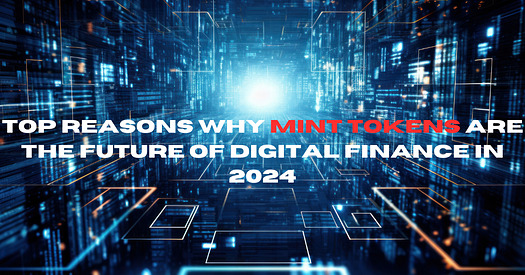
Understanding Mint Tokens
Mint tokens are digital assets created on a blockchain network. Unlike traditional cryptocurrencies like Bitcoin, which are mined through complex computational processes, mint tokens are typically created through a process called minting. This involves the issuance of new tokens directly on the blockchain, often by a centralized entity or through decentralized protocols.
Types of Mint Tokens
Mint tokens can serve various purposes, including utility tokens, security tokens, governance tokens, and even memecoins. Each type of token has its unique characteristics and use cases, contributing to the diverse ecosystem of digital finance.
1. Enhanced Security and Transparency
Blockchain Technology
One of the primary reasons mint tokens are gaining traction is their inherent security and transparency. Built on blockchain technology, these tokens benefit from decentralized and immutable ledgers, which record every transaction. This ensures that all token movements are transparent and verifiable, reducing the risk of fraud and enhancing trust among users.
Smart Contracts
Mint tokens often utilize smart contracts, which are self-executing contracts with the terms directly written into code. These contracts automatically enforce agreements and transactions, eliminating the need for intermediaries and further enhancing security and efficiency.
2. Accessibility and Inclusivity
Democratizing Finance
Mint tokens have the potential to democratize finance by providing access to financial services for individuals who are underserved by traditional banking systems. With just a smartphone and internet connection, anyone can participate in the digital economy, regardless of their location or socio-economic status.
Lower Barriers to Entry
Creating and trading mint tokens is often more accessible than traditional financial instruments. Platforms that facilitate the minting process have simplified the creation of new tokens, allowing users to launch their digital assets without extensive technical knowledge or significant capital investment.
3. Decentralized Finance (DeFi) Integration
Expanding the DeFi Ecosystem
Mint tokens are integral to the growth of decentralized finance (DeFi), a movement that aims to create an open and permissionless financial system. By integrating with DeFi protocols, mint tokens enable a wide range of financial activities, such as lending, borrowing, trading, and staking, without relying on centralized institutions.
Yield Farming and Liquidity Provision
One of the key features of DeFi is yield farming, where users earn rewards by providing liquidity to decentralized exchanges (DEXs) and other DeFi platforms. Mint tokens can be staked in liquidity pools, generating passive income for holders and contributing to the overall liquidity and stability of the DeFi ecosystem.
4. Enhanced Interoperability
Cross-Chain Compatibility
As the blockchain ecosystem grows, interoperability between different networks becomes increasingly important. Mint tokens are often designed to be cross-chain compatible, allowing them to move seamlessly between various blockchains. This enhances their utility and opens up new possibilities for decentralized applications (dApps) and financial services.
Bridging Traditional and Digital Finance
Mint tokens can also serve as a bridge between traditional financial systems and the emerging digital economy. By tokenizing real-world assets such as stocks, bonds, and real estate, mint tokens enable fractional ownership and easier transfer of these assets, making them more accessible and liquid.
5. Innovation in Tokenomics
Dynamic Supply Mechanisms
Mint tokens offer innovative tokenomics models that can adapt to changing market conditions. For example, some mint tokens have dynamic supply mechanisms that adjust the token supply based on demand, helping to stabilize prices and incentivize user participation.
Incentive Structures
Many mint tokens incorporate incentive structures to encourage long-term holding and active participation in the ecosystem. These incentives can include staking rewards, governance rights, and access to exclusive services or benefits, driving user engagement and loyalty.
6. Environmental Considerations
Energy Efficiency
Traditional proof-of-work (PoW) mining methods used by cryptocurrencies like Bitcoin are often criticized for their high energy consumption. In contrast, mint tokens typically use more energy-efficient consensus mechanisms, such as proof-of-stake (PoS) or delegated proof-of-stake (DPoS), reducing their environmental impact.
Sustainable Growth
As the world becomes more conscious of environmental issues, the sustainability of financial systems is gaining importance. Mint tokens, with their lower energy requirements and innovative approaches to consensus, align with the growing demand for environmentally friendly financial solutions.
7. Regulatory Compliance
Aligning with Regulations
As the cryptocurrency market matures, regulatory compliance is becoming a critical factor for the long-term success of digital assets. Mint tokens can be designed to comply with regulatory requirements, providing greater assurance to investors and facilitating wider adoption.
Enhancing Investor Confidence
Regulatory compliance enhances investor confidence by ensuring that mint tokens adhere to established legal and financial standards. This can attract institutional investors and contribute to the overall legitimacy and stability of the digital finance ecosystem.
8. Increased Adoption and Market Growth
Expanding Use Cases
The versatility of mint tokens is driving their adoption across various industries, from finance and gaming to supply chain management and healthcare. As more use cases emerge, the demand for mint tokens is expected to grow, further solidifying their position in the digital economy.
Mainstream Acceptance
Mint tokens are gaining mainstream acceptance as more businesses and individuals recognize their potential benefits. High-profile endorsements, partnerships, and integrations with established platforms are helping to drive awareness and adoption, paving the way for widespread use.
Conclusion
Mint tokens are poised to revolutionize digital finance in 2024, offering enhanced security, accessibility, and innovation. Their integration with DeFi, cross-chain compatibility, and environmentally friendly features make them a compelling choice for investors and users alike. As the digital finance landscape continues to evolve, mint tokens are set to play a pivotal role in shaping the future of the economy.
By understanding the unique advantages of mint tokens and staying informed about the latest developments, investors can position themselves to capitalize on the opportunities presented by this exciting and transformative technology. Whether you are a seasoned investor or new to the world of digital finance, mint tokens offer a promising avenue for growth and innovation in the years to come.
3 notes
·
View notes
Text
Benefits of UP Government Scholarships for Higher Education
Education is a transformative tool that paves the way for economic and social progress. In Uttar Pradesh, a state with a burgeoning young population, the pursuit of higher education is often hindered by financial constraints. Recognizing this, the UP Government has implemented various scholarship schemes to support students in their academic endeavors. These scholarships not only alleviate financial burdens but also foster a more educated and skilled workforce, contributing significantly to the state's development.
Empowering Economically Disadvantaged Students
One of the primary benefits of UP Government scholarships is the financial support they provide to economically disadvantaged students. Many families in Uttar Pradesh struggle to afford the costs associated with higher education, such as tuition fees, books, and living expenses. Scholarships like the Post-Matric Scholarship for OBC, SC, ST Students and the Dr. Ambedkar National Merit Scholarship help bridge this gap, enabling students from low-income families to pursue their academic goals without the burden of financial stress.
Promoting Educational Equity
The UP Government scholarships are designed to promote educational equity by ensuring that students from marginalized communities have access to higher education. Programs like the Pre-Matric and Post-Matric Scholarships specifically target students from Scheduled Castes (SC), Scheduled Tribes (ST), and Other Backward Classes (OBC). By providing these students with the necessary financial resources, the government helps level the playing field, ensuring that all students, regardless of their socio-economic background, have an equal opportunity to succeed.
Enhancing Academic Performance
Financial constraints often force students to work part-time jobs, which can detract from their academic performance. By alleviating these financial burdens, scholarships allow students to focus more on their studies. Research has shown that students who receive financial aid tend to have better academic outcomes compared to their peers who do not. With the support of UP Government scholarships, students can dedicate more time and energy to their coursework, leading to higher grades and better overall academic performance.
Encouraging Female Education
Another significant benefit of UP Government scholarships is their role in promoting female education. Initiatives like the Kanya Vidya Dhan Yojana are specifically aimed at encouraging girls to pursue higher education. By providing financial incentives, these scholarships help break down the barriers that often prevent girls from continuing their education beyond secondary school. As more women receive higher education, the state benefits from a more diverse and inclusive workforce, driving social and economic progress.
Reducing Dropout Rates
High dropout rates are a major challenge in Uttar Pradesh's education system. Financial difficulties are one of the leading causes of students dropping out of school and college. Scholarships play a crucial role in reducing these dropout rates by providing the necessary financial support to keep students in school. The Pre-Matric and Post-Matric Scholarships have been particularly effective in this regard, helping thousands of students complete their education and pursue successful careers.
Boosting Employment Opportunities
Higher education significantly enhances employability, and scholarships make it possible for more students to attain advanced degrees. The UP Government's focus on providing scholarships for higher education has a direct impact on the state's employment rates. By equipping students with the skills and knowledge needed for the workforce, these scholarships help create a more qualified and competitive labor market. Graduates who benefit from these programs are better positioned to secure well-paying jobs, contributing to the overall economic development of the state.
Fostering Innovation and Research
Scholarships also play a vital role in fostering innovation and research within the state. By supporting students in their pursuit of higher education, the UP Government is investing in the next generation of researchers and innovators. Scholarships like the Chief Minister's Fellowship Scheme provide funding for students to undertake advanced research projects, contributing to the state's academic and technological advancements. This not only enhances the state's reputation as a center for education and innovation but also attracts further investment and development.
Supporting Specialized Education
The UP Government scholarships also support students pursuing specialized fields of study. Scholarships for courses in engineering, medicine, and other professional degrees ensure that students have the resources they need to succeed in these demanding programs. By investing in specialized education, the government is helping to create a workforce that is skilled in critical areas, driving the state's economic and social progress.
Strengthening Community Development
The benefits of scholarships extend beyond individual students to their communities. Educated individuals are more likely to contribute positively to their communities, whether through improved health outcomes, higher levels of civic engagement, or increased economic stability. Scholarships help create a ripple effect, where the benefits of higher education spread throughout communities, fostering development and improving quality of life for all residents.
Encouraging Lifelong Learning
Scholarships also encourage a culture of lifelong learning. By making higher education more accessible, the UP Government is promoting the idea that learning is a continuous process that extends beyond traditional schooling. This culture of lifelong learning helps create a more adaptable and resilient workforce, capable of meeting the challenges of a rapidly changing global economy.
Strengthening Public Trust in Government
Effective scholarship programs can also strengthen public trust in the government. When students and their families see the tangible benefits of these programs, they are more likely to have confidence in the government's commitment to education and social welfare. This trust is crucial for the successful implementation of future policies and programs aimed at improving the state's education system.
Encouraging Diversity and Inclusion
UP Government scholarships promote diversity and inclusion within higher education institutions. By providing financial support to students from various socio-economic backgrounds, these scholarships help create a more diverse student body. This diversity enriches the educational experience for all students, fostering an environment of mutual respect and understanding.
The UP Scholarship 2024 empowers students in Uttar Pradesh by providing financial aid to pursue their educational dreams. Open to various categories including SC/ST, OBC, and minorities, this scholarship promotes equal access to education. Simplified application processes and timely disbursements make it a crucial initiative for nurturing academic talent and reducing financial barriers in the state.
Conclusion
The UP Government scholarships for higher education offer a multitude of benefits that extend beyond the individual recipients. By providing financial support, promoting educational equity, enhancing academic performance, and encouraging female education, these scholarships play a crucial role in the state's development. They help reduce dropout rates, boost employment opportunities, foster innovation, and support specialized education. Moreover, they strengthen community development, encourage lifelong learning, and build public trust in the government. Ultimately, these scholarships are an investment in the future of Uttar Pradesh, creating a more educated, skilled, and prosperous society.
2 notes
·
View notes
Text
An Ohio high school student said he's never witnessed racial tension at a lacrosse game until recently.
"While both teams are competing and having fun, this incident kind of crossed the line, made me feel some type of way. I passed the ball to one of my teammates and the dude comes up to me and says some other stuff and then says that — the N-word pretty much," Dominic Shaw, who is a junior at Pickerington High School Central, told WBNS.
"I was in complete shock in the moment."
Shaw said that after he heard someone use the N-word during his team's game against Olentangy Berlin, he told the game's officials but nothing was done.
"I mean, I talked to my [athletic director] after the incident. They said they would reach out to Berlin's [athletic director] and try to handle it. After the game, their coach came up to me and said they handled it, but nothing seemed to really happen," he said.
His father, Karl Shaw, said he will not tolerate any racial discrimination and is proud of how his son handled the situation.
"It upset me, only because he did everything right, he went to the grownups,” he said. "I'm proud of him. I'm extremely proud of the young man that he has grown into because he handled that the right way."
this is a good opportunity to bring up the racist history of lacrosse
While Lacrosse began as a sport played almost exclusively by Native Americans, it now is mostly associated with middle to upper-class white Americans. Furthermore, Lacrosse was not played by many people until the past twenty years when participates have consisted of mostly white Americans.
When we talk about the abundance of racism and inequality in sports, lacrosse is an appropriate place to start.
The racial slanders shouted by fans at the Sewanee men’s lacrosse game this past Saturday has, and could have, occurred at any sporting event. But the targeted hate towards players on Emmanuel’s team serves as a reminder of the racial inequities, socio-economic barriers, and colonialist history of lacrosse.
For all of my teammates, fellow players, coaches, and spectators of this beautiful game, there are a few ugly truths we must remember as we digest this weekends’ events and brainstorm ways to move forward.
Lacrosse is predominately white.
22 notes
·
View notes